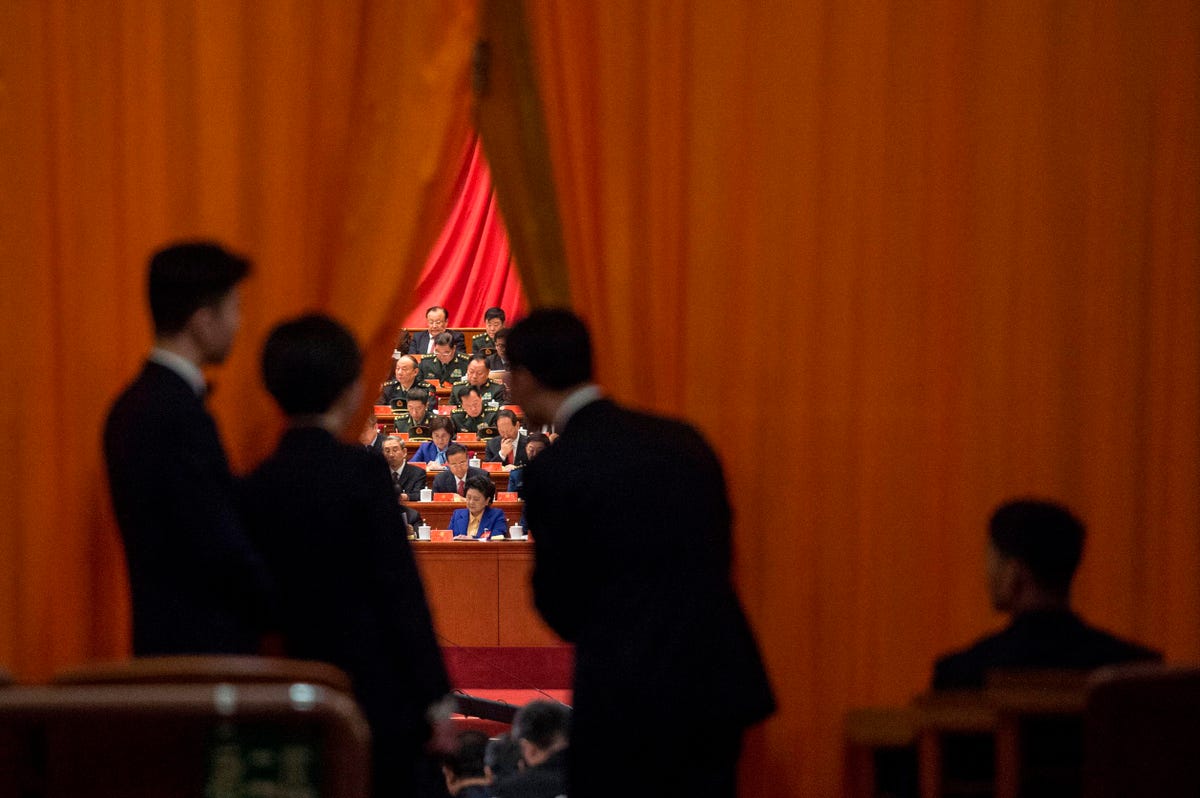
TOPSHOT – Chinese security guards look at military delegates during the speech of Chinese President … [+]
For personal reasons Ireland is one of my touchstones when trying to understand the ways in which the world is changing, and more generally it is an interesting laboratory to witness the effects of the rise and fall of globalization on a small open economy.
Globalization has markedly changed Ireland such that the Ireland of the 20th century is drifting steadily out of the collective memories of Irish people. In the middle of the 20th century, the country had few active trade and diplomatic links, something that led the writer Seán Ó’Faoláin to remark that ‘Ireland …is behind a Green Curtain that we have been rigging up for the last thirty years – thought proof, world proof, life proof’.
That is a remark on a country that was waiting to be reconnected with the world, but it recently came to mind when thinking of China.
Goodbye Didi
In the last week, under heavy pressure from the Chinese authorities, Didi Chuxing, the ride hailing company announced it would renege its NYSE market listing and instead list in China/Hong Kong. Also, this week the Women’s Tennis Association (WTA) have suspended their tennis tournaments in China in response to the disappearance of the player Peng Shuai.
She had been ‘recalled’ to China having accused accused Zhang Gaoli formerly a high-ranking Chinese Communist party official, of sexual assault, and she is since believed to been held under duress. While the Epstein trial shows that powerful men can behave appallingly wherever they are, the treatment of Peng is sinister, tone deaf to international public opinion and, has been repeated in the cases of other public figures.
MORE FOR YOU
As background I have just started reading the fascinating ‘Red Roulette’, Desmond Shum’s account of what happens to wealthy Chinese who rise too high too quickly (to spoil the surprise Shum details the murder, ‘suicides’ and disappearance of numerous Chinese billionaires).
Closed Off
Couple this with China’s antagonizing of nearly all of its neighbours (some of whom also threaten it), other snippets such as a collapse in passport issuance by the Chinese government (notwithstanding COVID), the exigencies of China’s COVID policy and a growing range of moves to establish self-sustainability and in some cases international monopoly in areas like data (LinkedIn has been cut off in China) and rare earths, and the picture grows of a China that is reinforcing its strategic autonomy, but also cutting itself off from the rest of the world and to adopt Ó’Faoláin’s terminology, enveloping itself in a ‘Red Curtain’.
This ‘Red Curtain’ process, if my view is correct, will be gradual but nonetheless meaningful. David Skilling points out that trade ties between the EU and China are still strong, and that American banks are keen to further implicate themselves in the Chinese financial system (Jamie Dimon of JPM is notable here, though less so for his diplomacy). However, Germany’s new government is markedly less China friendly than the Merkel one, and various EU level oversight processes will curb foreign (Chinese) investment into Europe.
In the big picture, the ‘Red Curtain’ is consistent with other countries or leaders (Brexit/Johnson, Trump, Bolsonaro) turning away from internationalism, and confirms the trend towards multipolarity.
Red Curtain
China’s size, the late stage of its very long business cycle (with a slowing property market) mean that the prospects of a ‘Red Curtain’ need to be taken seriously.
Diplomatically, it raises the problem that a more closed off China is harder to read from outside, and somewhat harder to deal with (ask Lithuania). Domestically, there is a risk that this more ‘closed’ approach creates a sense of risk aversion across entrepreneurs, a lack of debate about policy issues (especially at a local level) and as a result of this, a policy mistake. One structural policy error might be that productivity slows.
From an investors point of view what is interesting is that the heavy-handed approach of Chinese regulators and politicians has turned Chinese equities (especially those listed abroad like Alibaba) into ‘value’ investments. In contrast if US companies that export to China (think of Apple
Notably on the other side, more fund managers have mentioned to me that the Chinese government bond market begins to look attractive compared to those in the West. In that context, Chinese assets – having for long being regarded as a structural emerging market growth play – are becoming interesting for value investors.
Thought Proof?
Ultimately, whether this value is realized depends on one factor – the mind and ambition of Xi Jinping – by installing himself as China’s leader for the foreseeable future, he has tied the fate of his country to the wishes of one man, which history tells us is a risky strategy, especially if it leaves China ‘thought proof, world proof, life proof’.







